Graphical Transform Editor
The graphical Triangle viewport can be used to modify the selected matrix’s values (shown as a triangle).
A triangle is a convenient way of showing the selected matrix’s parameter values and allowing you to easily modify its values
2D Triangle mode:
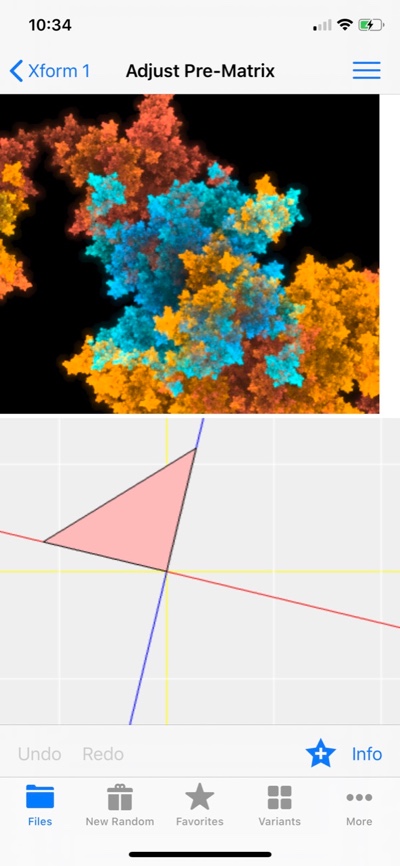
3D Tetrahedron mode:
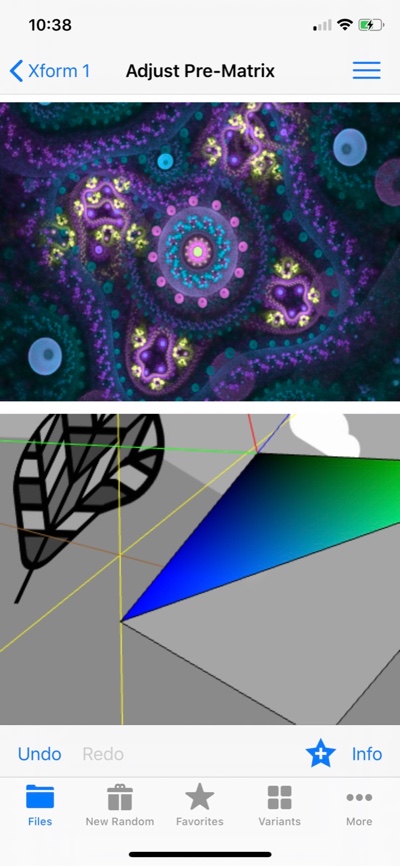
Transformation Matrix Concepts
Each Transform has:
- Pre Matrix
- Post Matrix
- Optional extra Variation Matrix instances
These are all classic Computer Graphics transformation matrices.
In Fractal Architect, fractals are either 2D or 3D.
2D fractals have 2D transformation matrices, while 3D fractals have 3D transformation matrices.
The Graphical Editor’s representation for the Matrix:
- 2D Matrix
- Represented by 1 Triangle. Manipulating the triangle, changes the matrix.
- 3D Matrix
- Represented by either 1 tetrahedron, or 3 triangles, one per XY, YZ, or ZX tetrahedron face.
- You can use either the Triangle or Tetrahedron editing mode to change the Matrix.
2D Fractal Menu
This is the Editor’s menu for 2D fractals.
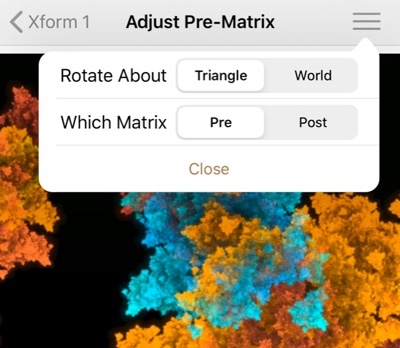
- Which Matrix
- Select either Pre or Post Matrix.
- Rotate About
- Select either Triangle or World.
3D Fractal Menu
This is the Editor’s menu for 3D fractals.
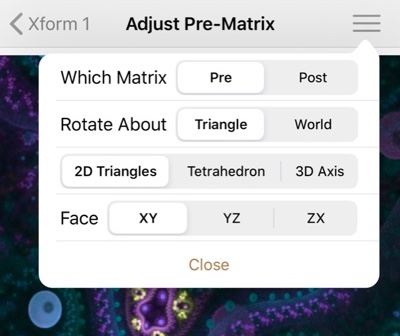
- Which Matrix
- Select either Pre or Post Matrix.
- Rotate About
- Select either Triangle or World.
- Mode Selector
- Choose either: 2D Triangles, Tetrahedron, or 3D Axis.
- Face
- For Triangle mode, choose either: XY, YZ, or ZX face to edit.
Using the Triangle Editor

Triangle Editor Toolbar
- Undo
- Undo the last change.
- Redo
- Redo the last undone change.
- Add to Favorites
- Add the current state of this fractal to Favorites.
- Info
- View the fractal info.
Adjusting the Size and Location of Triangles
If the triangles are either too small or too big to work with, the zoom magnification can be adjusted by:
- Long press with 1 finger, then drag your finger up/down to zoom out/in.
- Drag two fingers up/down to zoom out/in.
Note: The grid background will become darker during the drag to signify that you are modifying the viewport’s size and location - not the triangle.
Resetting the Viewport
You can reset the Viewport’s Size and Location to the original setting by:
- Double tap the viewport.
Moving the Triangle - Matrix Translation
Press the interior of the triangle and drag it.
Rotating the Triangle - Matrix Rotation
Use the standard rotation gesture with 2 fingers to rotate the triangle.
Shrinking/expanding the Triangle - Matrix Scaling
Two ways:
- Use the standard pinch gesture with 2 fingers to expand/contract the triangle.
- Press, with 1 finger, on the triangle edge opposite the origin triangle vertex and drag it back/forth.
Adjusting location of just one of the Triangle’s endpoints - Matrix Skew
Press and drag with 1 finger one of the triangle vertexes.
Undo
If you accidentally do the wrong operation, just tap on Undo button.
Using the Tetrahedron Editor
2D transforms are shown as a 2D triangle. 3D transforms are represented as a 3D tetrahedron. A tetrahedron is a solid object with 4 triangular faces (3 of these are editable).
Using either the mouse or trackpad, the graphical Tetrahedron viewport is used to modify the selected matrix’s values (shown as a 3D tetrahedron).
The tetrahedron is a convenient way of showing the selected 3D matrix’s parameter values and allowing you to easily modify its values.
The tetrahedron has 4 vertexes called:
- To (Black vertex)
- Tx (Blue vertex)
- Ty (Red vertex)
- Tz (Green vertex)
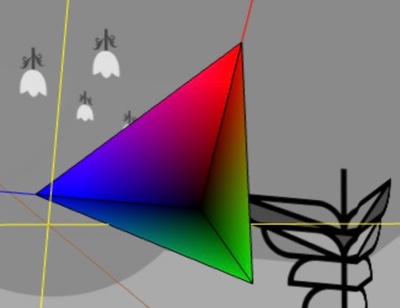
Note how 3 of the vertexes have colored lines (that are the same color as its vertex). These lines can be grabbed with the mouse and dragged to rotate the tetrahedron.
Tetrahedron Editor Toolbar
- Undo
- Undo the last change.
- Redo
- Redo the last undone change.
- Orient
- Go to 3D Axis mode to adjust the tetrahedron’s orientation, which becomes the 3D Axis of rotation/scaling.
- Add to Favorites
- Add the current state of this fractal to Favorites.
- Info
- View the fractal info.
Changing Viewport Zoom Magnification
If the tetrahedron is either too small or too big to work with, the zoom magnification can be adjusted by:
- Long press with 1 finger, then drag your finger up/down to zoom out/in.
- Drag two fingers up/down to zoom out/in.
This operation does not change the 3D transform, just the camera’s zoom.
Moving the center of the window relative to the tetrahedron
Press outside of the tetrahedron and drag your finger. The camera center will move around the view.
This operation does not change the 3D transform , just the camera’s location.
Camera - 3D Axis
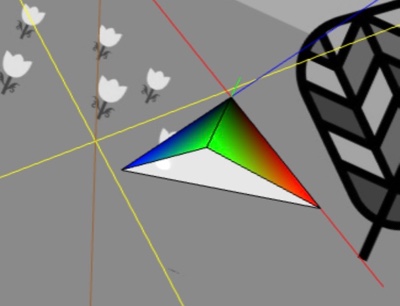
Adjusting the Camera’s orientation lets you view the tetrahedron from any orientation. The background skybox image gives you some feedback on the camera’s orientation.
Important !! The camera’s orientation sets both the rotation axis and the 3D plane in which the vertexes are moved by editing operation.
Tetrahedron Editor Toolbar
- Undo
- Undo the last change.
- Redo
- Redo the last undone change.
- Editor
- Go to Tetrahedron editing mode.
- Add to Favorites
- Add the current state of this fractal to Favorites.
- Info
- View the fractal info.
Change Camera’s Orientation First
The Camera Orientation is very important. It defines an arbitrary axis of rotation for the tetrahedron (see rotation below). It also defines the plane about which the tetrahedron will be translated by mouse dragging.
The Tetrahedron editor view shows a simple skybox image scene in the background. This scene helps you to “see” the camera’s orientation. (So you know if you are looking down/up/left/right)
The camera’s orientation (rotation) relative to the tetrahedron can be changed.
- Select 3D Axis Adjust mode using the Menu > 3D Axis.
- Press and drag with 1 finger adjusts the current Camera’s orientation relative to the tetrahedron.
- Go back to Tetrahedron editing mode using Menu > Tetrahedron.
Moving the Tetrahedron - Matrix Translation
Press the interior of the tetrahedron and drag it.
Rotating the Tetrahedron - Matrix Rotation
Use the standard rotation gesture with 2 fingers to rotate the tetrahedron.
Shrinking/expanding the Tetrahedron - Matrix Scaling
- Use the standard pinch gesture with 2 fingers to expand/contract the triangle.
Adjusting location of Tetrahedron’s vertexe- Matrix Skew
Press and drag with 1 finger one of the tetrahedron vertexes.